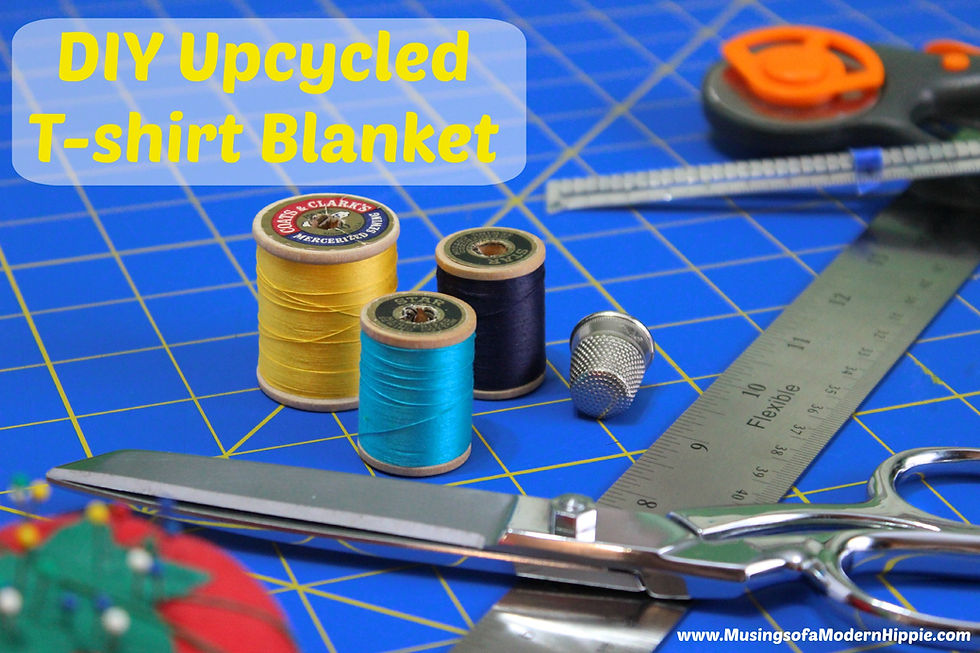Upcycled T-shirt Blanket
- Modern Hippie

- Dec 15, 2014
- 3 min read
If you are anything like me, you've accumulated quit a number of t-shirts over the years through various events, concerts, schools, and businesses. If you can’t bear to part with those t-shirts, or to use them as work shirts or rags, here’s an idea to preserve the memories, while still upcycling them into something new and useful!

This project is easy enough for even those new to sewing to accomplish. And it’s customizable, so you can make it as small or big as you want.
{Don’t know how to sew, but still want a blanket? I can help! Check out my Etsy store to order your own custom t-shirt blanket now…I even include free shipping both ways!}

DIY Upcycled T-shirt Blanket
{I get commissions for purchases made through links in this post.}

Step 1:
Collect your shirts and plan your blanket size. For a point of reference, 25 large t-shirts, sewn 5 squares by 5 squares will cover a king-size bed perfectly.
Tip: Prewash your t-shirts to make sure they are pre-shrunk. This will prevent strange pulling when you launder your blanket down the road.

Step 2:
Find your smallest shirt. This will be your reference shirt. It is important to make sure all your squares are the same size as this one will be.
Lay your shirt out flat and cut along each side to make a perfect square. I highly recommend using a cutting mat and long metal ruler along with a rotary cutting tool or professional sheers. Really saves time and makes the job easier. Try and cut the square as large as possible.
Hint: Save your scraps for later!

Step 3:
Cut the remaining shirts the same way, this time, laying the first square on top to use as a template.

Step 4:
Once all the squares are cut out, separate the backs and fronts of each shirt panel. Lay out each side, mirroring the back to the front. It's important to mirror them, not lay them out identically, so that the sides will match when put back together.

Step 5:
Start stitching the squares together, right sides facing each other.
I've used a simple straight stitch before, since it was just a throw blanket for myself and I wasn't particular about how the seams looked, but if you have a stretch stitch on your machine, I highly recommend using it for these stretchy knits to prevent bunching and stretched out seams. I also recommend using the highest quality thread you can find, specifically for knits, and a ballpoint needle also specifically for knits.
(And wouldn't a serger be awesome right about now??)
If you are a more advanced sewer and your machine allows it, now’s the time to use a double needle and zigzag foot as well. (Use a simple straight stitch for double needles.)
Another good idea is a walking foot if you have one.
None of the above? Then your next best option is a narrow and short zigzag stitch.
Last tip at this point is to guide your fabric through your machine carefully, to avoid stretching it out.

Step 6:
Once you have all the squares stitched together for both the front and back, put the insides (“backs”) together. It helps to sew them together at this point, but you don’t have to.
If you are using ribbon for your edging, fold it in half the long way, tuck the edge of the blanket inside, and stick it down. A straight stitch is fine here.

If you want to get a little fancier, you can cut your scraps into pieces, stitch them together into one long piece, and sew that to the edges as your border.

Another alternative for those scraps is to cut them up and turn them into reusable cloth napkins. We have a bin on the kitchen counter for clean ones (and we don’t even bother folding them)! They absorb well, and we don’t stress when the little one needs to use 20 napkins for one meal.

Step 7:
Trim your excess fabrics and threads.

DONE!
How did yours come out?








Comments